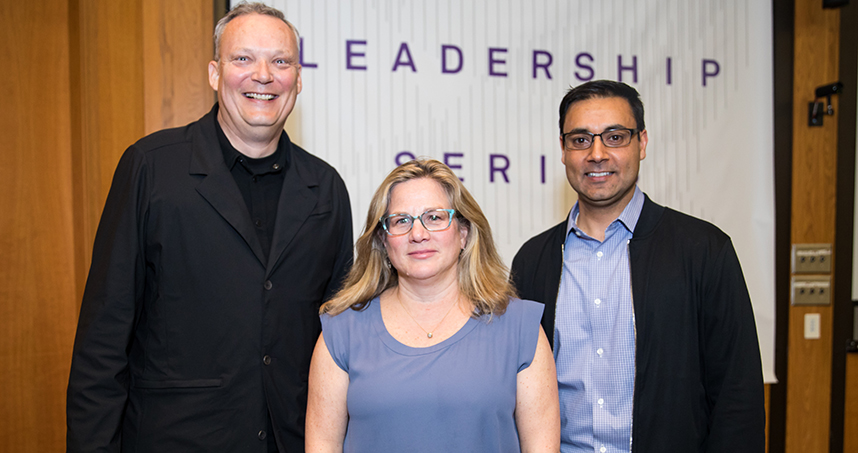Accenture’s Baiju Shah Visits Campus to Discuss the Future of Design and Strategy
Shah spoke on campus on April 17 as part of the Segal Design Leadership Series
When Baiju Shah was growing up, he viewed Star Wars as a purely science fiction movie, full of impossibilities. Yet, drones now fly around all over the world, and robots exist that are friendly and collaborate with humans.
Shah now says the genetic selection shown in the 1997 movie Gattaca doesn’t seem so far off with the recent design of a baby through the CRISPR gene editing tool. And the storyline of Her, where Joaquin Phoenix’s character falls in love with his operating system feels realistic, considering that Siri and Alexa are part of people’s everyday lives.
“It does seem like anything that we imagine, we can make, and technology is no longer the limitation,” said Shah, chief strategy officer for Accenture Interactive and global lead at Fjord, Accenture’s design and innovation unit. “But what’s even more interesting is the pace of creation is actually increasing.”
Shah discussed design’s role in developing breakthroughs in his talk “Design and Strategy: What’s Next?” as part of the Northwestern Engineering Segal Design Leadership Series, presented by the Segal Design Institute at the James L. Allen Center on April 17. Reflecting on insights through design and innovation consultancy projects at Fjord, Shah (KSM ’08) explained the growing importance of design to business and society.
Consumers’ changing expectations present businesses with new challenges beyond direct competitors. Now, experiential competitors replace the need for existing products and services, and perceptual competitors work to set consumers’ expectations.
“These are different charges of competition that many business leaders didn’t grow up managing. They also didn’t grow up managing this level of disruption on the technology side,” Shah said. “Expectations are rising faster than organizations’ ability to chase them. Some organizations have moved forward, but the expectation is that you’re moving faster.”
Design is at the center of unlocking business potential and facing these challenges, Shah said. For instance, Shah’s team at Fjord helped Farmers Insurance reimagine a subscription service for renter’s insurance in just eight weeks, called Toggle, which yielded five times the number of policies than expected.
“There’s some element of taking a design view to an old problem, and you might have a breakthrough,” he said. “It’s making it simple and taking advantage of the innovations in a responsible way.”
Shah was joined by Martha Cotton, who leads the design research practice at Fjord Global and is an adjunct lecturer for Segal. She explained how Accenture is embracing a more human-centered approach to strategy to increase customer confidence during this period of rapid innovation.
“It’s not a new idea to think of human-centered strategy, but when you think about it in the context of bridging collective confidence, it imbues it with a lot of meaning and a lot more urgency,” Cotton said. “There’s no shortage of ideas. It’s really situating those ideas in a context that gives ourselves and our clients that confidence.”


